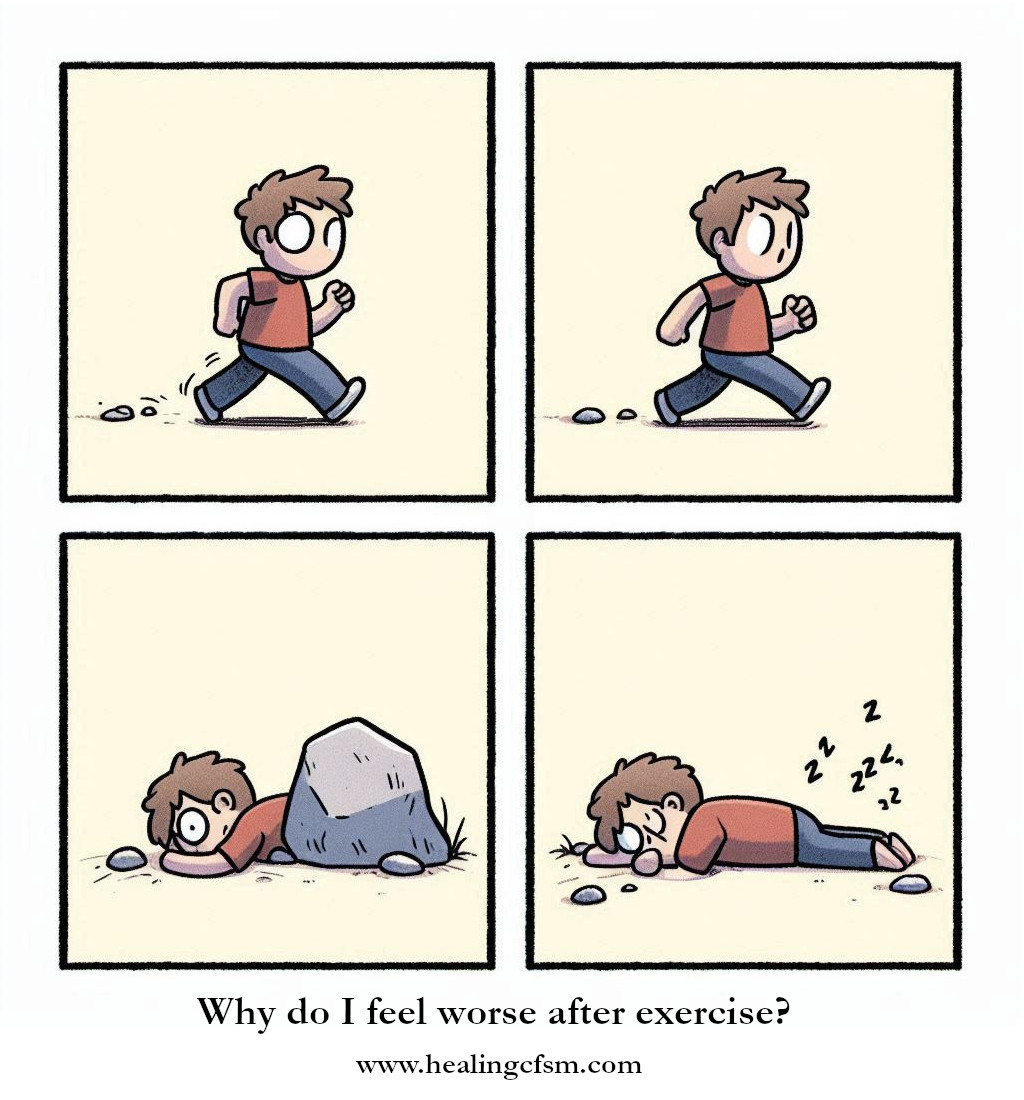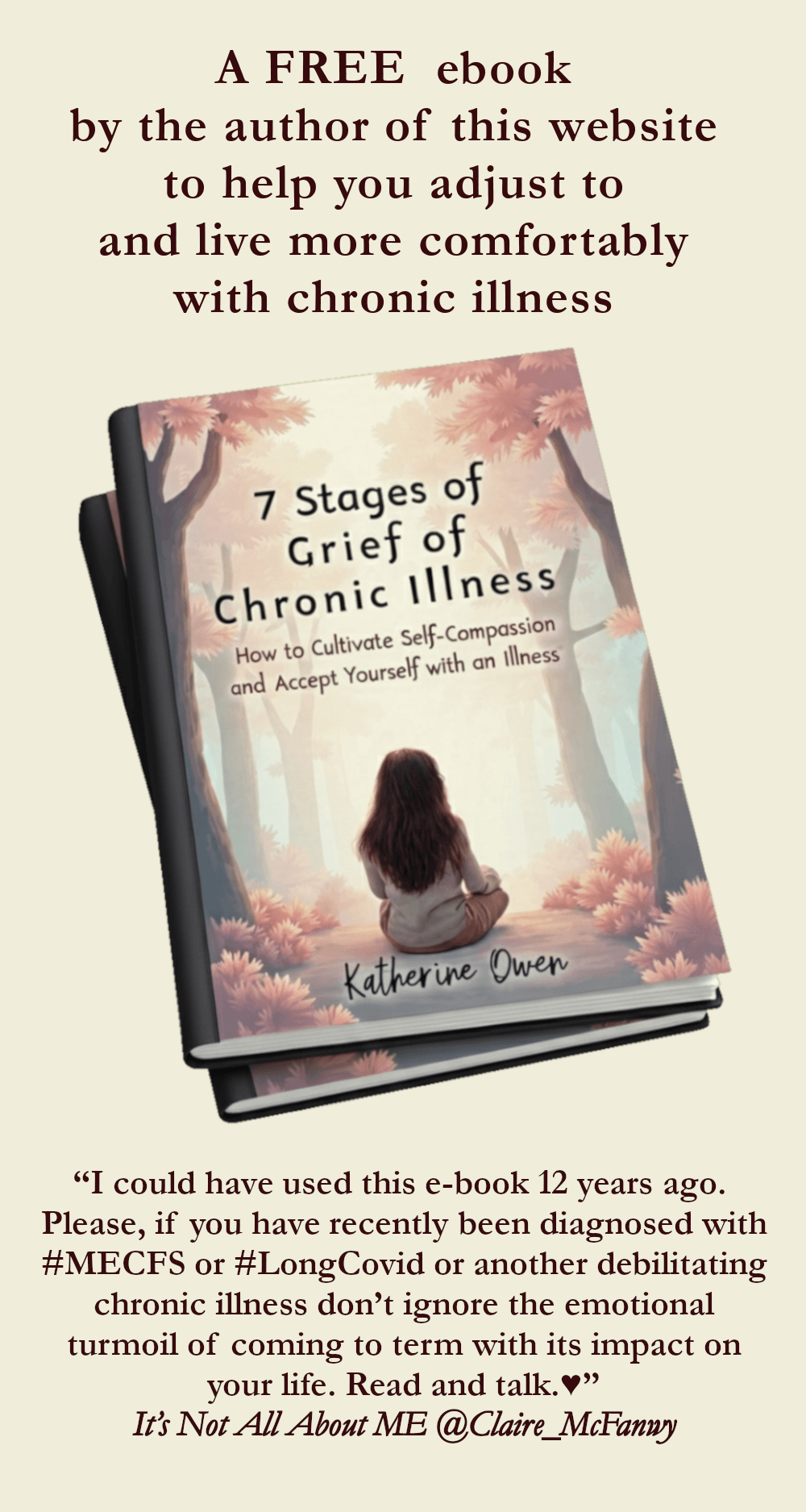and move towards health
Why do I feel worse after exercise?
This article is for you if you’re asking the question, why do I feel worse after exercise?
You may have known for a while that you feel worse after exercise
If you’re coming to this article from elsewhere on this
website, you may be someone who lives with a condition such as chronic fatigue
syndrome (CFS), Myalgic Encephalomyelitis (ME) or long covid (covid long haul).
You may have known for a while that you feel
worse after exercise.
You may be looking for the answer to...
- How do I help someone to understand that exercise is not good for me?
- Is there science and research to support my experience that I feel worse after exercise?
Or click here to CHOOSE FROM
A RANGE OF personalizable cards and gifts.
The healing-themed gifts are designed by myself, Katherine, the author of
this website HealingCFSME.com
Proceeds go towards the cost of the website. Thank you. Enjoy!
Is feeling worse after exercise new for you?
For some of you, Why do I feel worse after exercise? is a new question in response to a new behaviour on the part of your body.
A healthy body responds to exercise by feeling invigorated, or needing to rest and then quickly recovering. If this is not happening for you it is worth exploring the reasons.
My history is that in the final year of university, I had an
operation, and after that, although I played a sport twice a week for the rest
of the year, I didn’t get fit, and often felt pretty bad afterwards.
I was
young and fit, and continued pushing through.
Fast forward to a number of years later and I had become severely ill with a diagnosis of Myalgic Encephalomyelitis.
If feeling worse after exercise is a new thing for you, and you are healthy, much of this article may not be relevant to you. There may be some simple tweaks you can make to be able to continue to exercise and once again receive benefit from doing so.
But whatever you choose to do, I do ask you to consider taking more rest between exercise, and pay more attention to how you feel after exercise.
By learning to incorporate rest of high quality into your daily life, you may well stop yourself from developing an illness such as ME, chronic fatigue syndrome or similar.
The cause of ME/CFS may be a virus, and that is clearly
the case with long covid. Even so, a history of pushing through symptoms and continuing
to exercise is a common observation in those who go on to live longterm with chronic
illness.
The body has an ability to heal itself, and an appropriate balance of rest and exercise can help it to do so.
Contents for Why do I feel worse after exercise
Information on this page includes the following:
- Research giving an answer to: Why do I feel worse after exercise? - acid accumulation
- Muscular changes in fibromyalgia patients: Significantly higher elevations of lactate
- Mitochondrial Depletion
Research that observes the phenomenon of an abnormal response to exercise.
- Postural orthostatic tachycardia syndrome (POTS) is an under-recognized condition in chronic fatigue syndrome
- Research: Post exertional fatigue found in people with Myalgic Encephalomyelitis
- The duration of postexertional malaise symptoms following a known stressor
Reading about this ME and Chronic Fatigue Syndrome research can be highly validating if you are feeling bad about yourself that you can’t exercise as much you would like to do.
It may also help you with benefits claims or with explaining to loved ones why you can’t engage in activities in the way you would like to do.
Please note, my area of interest is in meeting the emotions, feelings and thoughts that accompany illness with compassion. My ability to retain knowledge of research into Chronic Fatigue Syndrome/ ME is low!
All the more reason to compile a list and share it with those who feel likewise!
I have quoted names and papers in case you wish to look
further into the research results.
And if you want to inform the visitors of further research, I'd be glad to receive it in the guest book.
CFS/ ME and Exercise: Research giving an answer to: Why do I feel worse after exercise? Acid accumulation
Research into CFS Symptoms of muscle and joint pain.
The scientific research finding:
Two key findings are as follows:
1. People with CFS and ME have acid accumulation in their muscles up to 20 times the normal amount. These findings were similar for people living with other chronic disease.
2. Two types of muscle cell
abnormalities were seen. One may improve with exercise, but the other
one will not. This may explain why some people are helped by graded
exercise whereas others are made worse.
Who is behind the research finding:
Dr. Newton, Dean of clinical medicine at the
School of Clinical Medical Sciences of Newcastle University, England, UK.
When: July 2014
Where can I learn more:
Listen to the video below.
Link: I am having trouble tracking down a link to the research. I can't see it on the Newcastle University website. If you find it, please let me know.
How wonderful it will be if these acid accumulations can be reversed.
Wishing you a better day tomorrow than today.
With Love,
Katherine
Muscular changes: Significantly higher elevations of lactate
High elevations of lactate compared to normal have been found in the trapezius muscle of patients with fibromyalgia (FM). Also in women with chronic widespread pain – a condition similar to FM.
Where can I read more:
https://www.healthrising.org/blog/2016/03/01/lactate-fibromyalgia-chronic-fatigue-syndrome/
The above is an excellent article. Along with the observation of high elevations of lactate, it also discusses the following.
- Low oxygen conditions associated with increased pain in fibromyalgia
- EEG studies suggesting the muscles in patients with fibromyalgia have trouble relaxing, causing them to stay in a more contracted state
Mitochondrial Depletion
Theory: The reason for feeling worse after exercise is due to anaerobic respiration – a less efficient and more toxic form of energy production – is attempting to compensate for a broken aerobic energy production system.
Published where: The Biophysical Chemistry journal
Country: Germany
Where can I read about the research:
Research that observes the phenomenon of an abnormal response to exercise
The following three pieces of research don't explain the abnormal response to exercise but they do demonstrate that post exertional malaise or fatigue does exist.
Postural orthostatic tachycardia syndrome (POTS) is an
under-recognized condition in chronic fatigue syndrome
Conclusion:
POTS is a frequent finding in patients with CFS/ME.
They propose that clinical evaluation of patients with CFS/ME should include
response to standing.
They recommend further research to determine the optimum intervention strategy
to manage POTS in those with CFS/ME.
Who: A. Hoad , G. Spickett , J. Elliott , J. Newton
When: 19 September 2008
Country: UK
Where can I read about the research: https://academic.oup.com/qjmed/article-abstract/101/12/961/1564413
Research: Post exertional fatigue found in people with Myalgic Encephalomyelitis
With regard to the work of Dr Newton above, post exertional fatigue was similarly demonstrated by the Workwell Foundation in the US.
They had a two-day testing
protocol for ME.
ME patients were compared with people who lived a sedentary life
but were not disabled.
The results demonstrated the post exertional increase of
symptoms in ME patients.
The Workwell Foundation strongly advises against using aerobic exercise in an attempt to improve the health of people with ME.
When: November 2013
Research by Professor Van Ness, published in Physical Therapy as – Discriminative Validity of Metabolic And Workload Measurements To Identify Individuals With Chronic Fatigue Syndrome, Christopher R Snell at Al. Volume 93 November 2013 pages 1484– 1492.
http://ptjournal.apta.org
ME and Exercise: The duration of postexertional malaise symptoms following a known stressor
When: March 15, 2023
What? Effort to quantify the duration of postexertional malaise (PME) symptoms following a known stressor.
Published where: National library of medicine,
Conclusion:
ME/CFS subjects took about two weeks on average to recover from the stressor.
The control participants only took two days to recover.
This data confirms that those living with ME/CFS experience post exertional malaise (PME) and take an extended amount of time to recover.
The implication of this research is that well informed consent must be given prior to recommending exercise for people with Myalgic Encephalomyelitis CFS.
Find out more here: https://pubmed.ncbi.nlm.nih.gov/36984572/
Move to TOP
Links relevant to Why do I feel worse after exercise?
- Research into the energy metabolism of patients with the illness ME - Myalgic Encephalomyelitis.
- Click to read advice about how to manage your energy and movement levels when living with the illness ME by pacing activity.
- Click the link in the middle below for an article which explores the danger of too much exercise for your current level of health.
- Home Page
- CFS and Exercise
- Why Do I Feel Worse After Exercise
Receive daily inspiration...
by putting your favorite (favourite) healing quote on
a mug, cushion, postcard, coaster, T shirt etc.
You will find my zazzle gift store at
zazzle.com/HealingStore.
Use one of my designs or start from a blank.
Thank you from me, Katherine, author of HealingCFSME.com
 |
© Katherine T Owen. All articles on this website are copyrighted. I am delighted if you choose to click above to share this page on social media, but please
do not copy, print or otherwise use without my permission. Thank you. Disclaimer:
I am not a medical practitioner. The articles on this website are not
to be taken as medical advice. Please consult a medical practitioner as
necessary. |
















